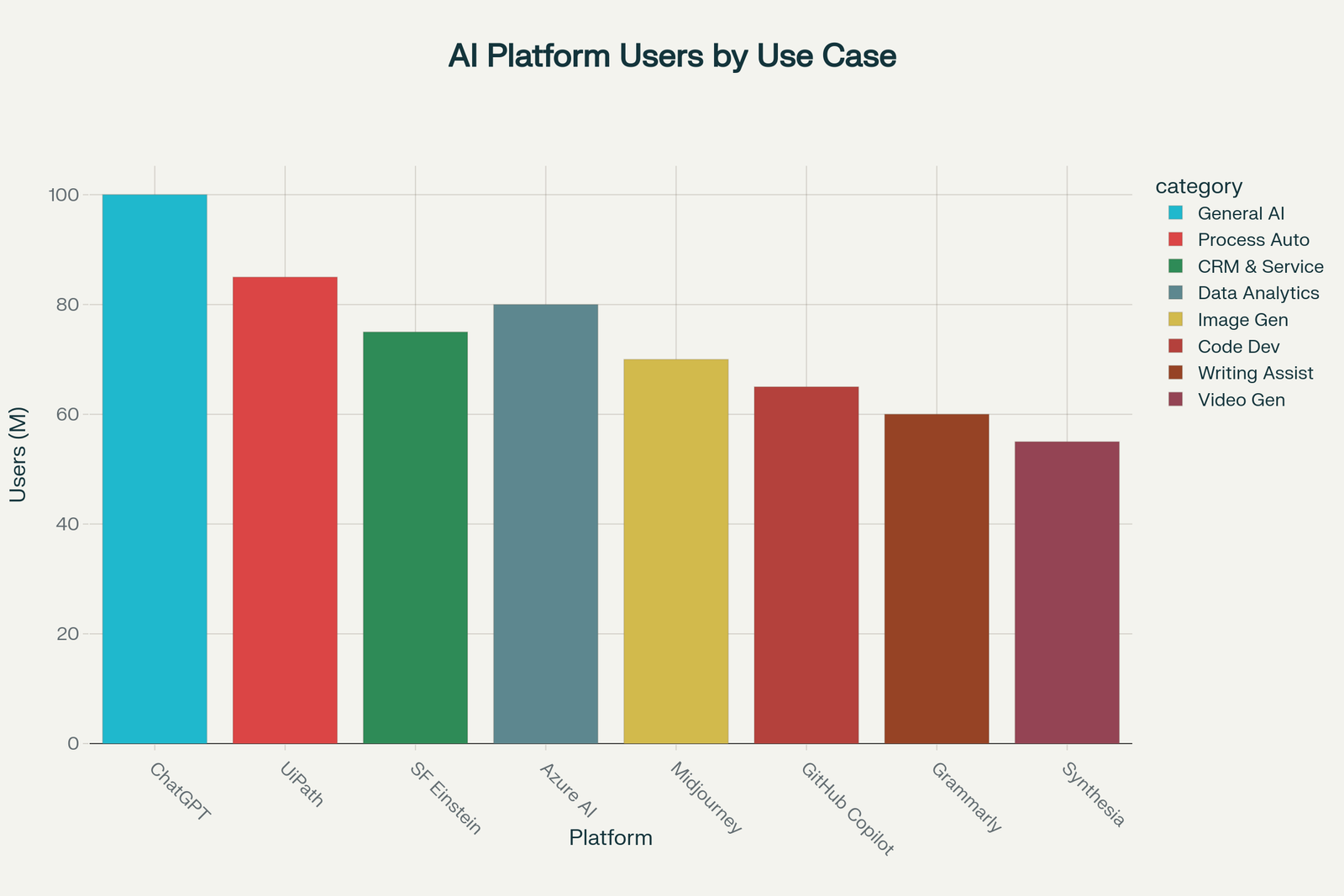The artificial intelligence landscape has exploded with diverse platforms, each designed to serve specific purposes and industries. As we navigate through 2025, understanding these various AI platforms and their unique applications is crucial for businesses and individuals looking to leverage AI's transformative power.
Understanding AI Platforms
AI platforms are comprehensive software solutions that provide the infrastructure, tools, and services necessary for developing, deploying, and managing AI applications. These platforms democratize AI by making advanced capabilities accessible to users without requiring deep technical expertise in machine learning or data science.
Categories of AI Platforms
1. Conversational AI and General Assistants
ChatGPT
Purpose: General-purpose conversational AI and text generation Key Features:- Natural language processing and generation
- Code writing and debugging assistance
- Creative content creation
- Problem-solving and analysis
Claude
Purpose: Advanced conversational AI with strong reasoning capabilities Key Features:- Long-context understanding
- Ethical AI responses
- Document analysis and summarization
Google AI (Bard/Gemini)
Purpose: Multimodal AI assistant integrated with Google services Key Features:- Image and text processing
- Integration with Google Workspace
- Real-time information access
2. Business Process Automation
UiPath
Purpose: Robotic Process Automation (RPA) with AI enhancement Key Features:- Workflow automation
- Computer vision for screen navigation
- Integration with AI and machine learning models
Microsoft Azure AI
Purpose: Comprehensive cloud-based AI services Key Features:- Custom machine learning models
- Cognitive services (vision, speech, language)
- AI-powered analytics and business intelligence
3. Customer Relationship Management
Salesforce Einstein
Purpose: AI-powered CRM enhancement Key Features:- Predictive analytics for sales forecasting
- Automated customer service responses
- Personalized customer experience delivery
4. Creative and Content Generation
Midjourney
Purpose: AI-powered image generation from text prompts Key Features:- High-quality artistic image creation
- Style adaptation and customization
- Batch processing capabilities
DALL-E
Purpose: Advanced text-to-image generation Key Features:- Photorealistic image creation
- Style manipulation
- Image editing and inpainting
Synthesia
Purpose: AI video generation with digital avatars Key Features:- Text-to-video conversion
- Multilingual avatar creation
- Custom branding and templates
5. Development and Programming
GitHub Copilot
Purpose: AI-powered code completion and programming assistant Key Features:- Real-time code suggestions
- Multiple programming language support
- Context-aware completions
Replit
Purpose: Cloud-based coding environment with AI assistance Key Features:- Collaborative coding
- AI code generation
- Integrated development environment
6. Writing and Communication
Grammarly
Purpose: AI-powered writing enhancement Key Features:- Grammar and spell checking
- Style and tone suggestions
- Plagiarism detection
Jasper (formerly Jarvis)
Purpose: AI content creation for marketing Key Features:- Brand voice consistency
- SEO optimization
- Multi-format content generation
7. Data Analysis and Business Intelligence
Tableau with Einstein Analytics
Purpose: AI-enhanced data visualization and analytics Key Features:- Automated insights discovery
- Natural language querying
- Predictive modeling
DataRobot
Purpose: Automated machine learning platform Key Features:- No-code ML model building
- Automated feature engineering
- Model deployment and monitoring
8. Search and Knowledge Management
Perplexity AI
Purpose: AI-powered search engine with source citations Key Features:- Real-time web search with AI analysis
- Source attribution and verification
- Conversational search interface
GoSearch
Purpose: Enterprise search and knowledge management Key Features:- Semantic search across company data
- Multimodal search capabilities
- AI-powered data analysis
9. Specialized Industry Platforms
DeepL
Purpose: Advanced language translation Key Features:- High-quality translation across 30+ languages
- Document translation
- API integration
Notion AI
Purpose: AI-enhanced productivity and note-taking Key Features:- Content generation within documents
- Automated summaries
- Template suggestions
10. Voice and Audio Processing
Murf
Purpose: AI voice generation and text-to-speech Key Features:- Natural-sounding voice synthesis
- Multiple voice options and languages
- Custom voice cloning
Otter.ai
Purpose: AI-powered meeting transcription and note-taking Key Features:- Real-time transcription
- Speaker identification
- Meeting summaries and action items
Choosing the Right AI Platform
When selecting AI platforms for specific purposes, consider these factors:
1. Purpose Alignment
Match the platform's core strengths with your specific needs. For content creation, choose specialized tools like Midjourney or Synthesia rather than general-purpose platforms.2. Integration Capabilities
Consider how well the platform integrates with your existing tools and workflows. Platforms like Salesforce Einstein work best within established CRM ecosystems.3. Scalability and Pricing
Evaluate cost structures and scalability options. Some platforms offer free tiers for experimentation, while others require enterprise-level commitments.4. Data Security and Compliance
For business applications, ensure the platform meets your industry's security and compliance requirements.Future Trends in AI Platforms
Multimodal AI Integration
Platforms are increasingly combining text, image, audio, and video processing capabilities, as seen in GPT-4o and Google's Gemini.No-Code/Low-Code Solutions
More platforms are enabling non-technical users to build and deploy AI solutions without programming knowledge.Industry-Specific Specialization
AI platforms are becoming more specialized for specific industries like healthcare, finance, and manufacturing.Conclusion
The diversity of AI platforms in 2025 reflects the technology's maturity and widespread adoption across industries. From general-purpose assistants like ChatGPT to specialized tools like UiPath for automation, each platform serves distinct purposes while collectively transforming how we work and create.
The key to success lies in understanding your specific needs and selecting platforms that align with your goals, budget, and technical requirements. As AI continues to evolve, these platforms will become even more powerful and accessible, making artificial intelligence an indispensable part of our digital toolkit.
Success in leveraging AI platforms comes from strategic selection and thoughtful integration rather than trying to use every available tool.